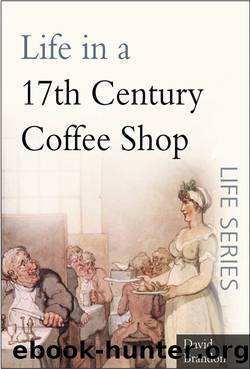Life in a 17th Century Coffee Shop by David Brandon

Author:David Brandon
Language: eng
Format: epub
Tags: Life in a 17th-Century Coffee Shop
ISBN: 9780752470474
Publisher: The History Press
Published: 2011-09-28T00:00:00+00:00
CHAPTER 6
A Coffee House for Every Cause and Interest
All nations use coffee as an aid to conversation.
P.G. Hamerton, The Intellectual Life
One of the most obvious characteristics of the coffee houses was how each tended to attract a specialised clientele. They became the acknowledged meeting place for members of a particular profession or occupation, for those with shared aims â perhaps what would now be called an interest group â or sometimes simply for those who wanted the company of the like-minded.
Often the kind of clientele who used a particular coffee house reflected the activities that were carried on in that part of London. Lloydâs and Garrawayâs, for example, attracted the businessmen in the financial quarter around the Royal Exchange in the City of London. In Westminster St Jamesâs and the Cocoa-Tree were much used by politicians, the former associated with the Tories, the latter with the Whigs. Many coffee houses were sited close to St Paulâs Cathedral and frequented by clergymen and intellectuals eager to debate theological and philosophical issues.
Willâs Coffee House in Covent Garden, once a seedy drinking den called the Red Cow, was famed as the resort of Londonâs literati. The self-appointed guru of Willâs was the poet and playwright John Dryden (1631â1700). Here he held forth to a rapt audience with his views on the most recently published or performed poems and plays, and his reputation was such that many highly distinguished men of letters such as Samuel Pepys and Alexander Pope became habitués of Willâs, eager to absorb his latest pronouncements. This probably gave Dryden undue power as a literary critic and an arbiter of literary taste. Unimpressed by Willâs was the acerbic Irish clergyman and wit Jonathan Swift, who in âHints to an Essay on Conversationâ disparagingly wrote of the company he observed there:
The worst conversation I ever remember to have heard in my life was that at Willâs Coffeehouse, where the wits (as they were called) used formerly to assemble; that is to say, five or six men who had writ plays . . . entertained one another with their trifling composures in so important an air, as if they had been the noblest efforts of human nature, or that the fate of kingdoms depended on them.
On Drydenâs death, Willâs rapidly changed its character and became devoted to the gambling craze of the time. Its mantle was later assumed, among others, by Buttonâs Coffee House, also in Covent Garden. Here the guiding light was Joseph Addison (1672â1719), essayist and politician. Addison contributed to the Tatler magazine started by his close friend Richard Steele in 1709 and to its more significant successor, the Spectator. The Tatler mainly concerned itself with literature, manners and morals, and advocated moderation and toleration in politics and religion. The Spectator had a wide and prestigious readership and Willâs, Addison and Steele between them were unquestionably highly influential in spreading the idea of a liberal âpoliteâ culture among the educated middle classes of the time. As Dr Johnson said in his
Download
This site does not store any files on its server. We only index and link to content provided by other sites. Please contact the content providers to delete copyright contents if any and email us, we'll remove relevant links or contents immediately.
| Belgium | France |
| Germany | Great Britain |
| Greenland | Italy |
| Netherlands | Romania |
| Scandinavia |
Room 212 by Kate Stewart(5123)
The Crown by Robert Lacey(4817)
Endurance: Shackleton's Incredible Voyage by Alfred Lansing(4783)
The Iron Duke by The Iron Duke(4356)
The Rape of Nanking by Iris Chang(4213)
Joan of Arc by Mary Gordon(4113)
Killing England by Bill O'Reilly(4004)
Say Nothing by Patrick Radden Keefe(3987)
I'll Give You the Sun by Jandy Nelson(3447)
Shadow of Night by Deborah Harkness(3368)
Hitler's Monsters by Eric Kurlander(3343)
Mary, Queen of Scots, and the Murder of Lord Darnley by Alison Weir(3210)
Blood and Sand by Alex Von Tunzelmann(3205)
Eleanor & Park by Rainbow Rowell(3176)
Darkest Hour by Anthony McCarten(3133)
Margaret Thatcher: The Autobiography by Thatcher Margaret(3082)
Book of Life by Deborah Harkness(2939)
Red Famine: Stalin's War on Ukraine by Anne Applebaum(2934)
The One Memory of Flora Banks by Emily Barr(2863)
